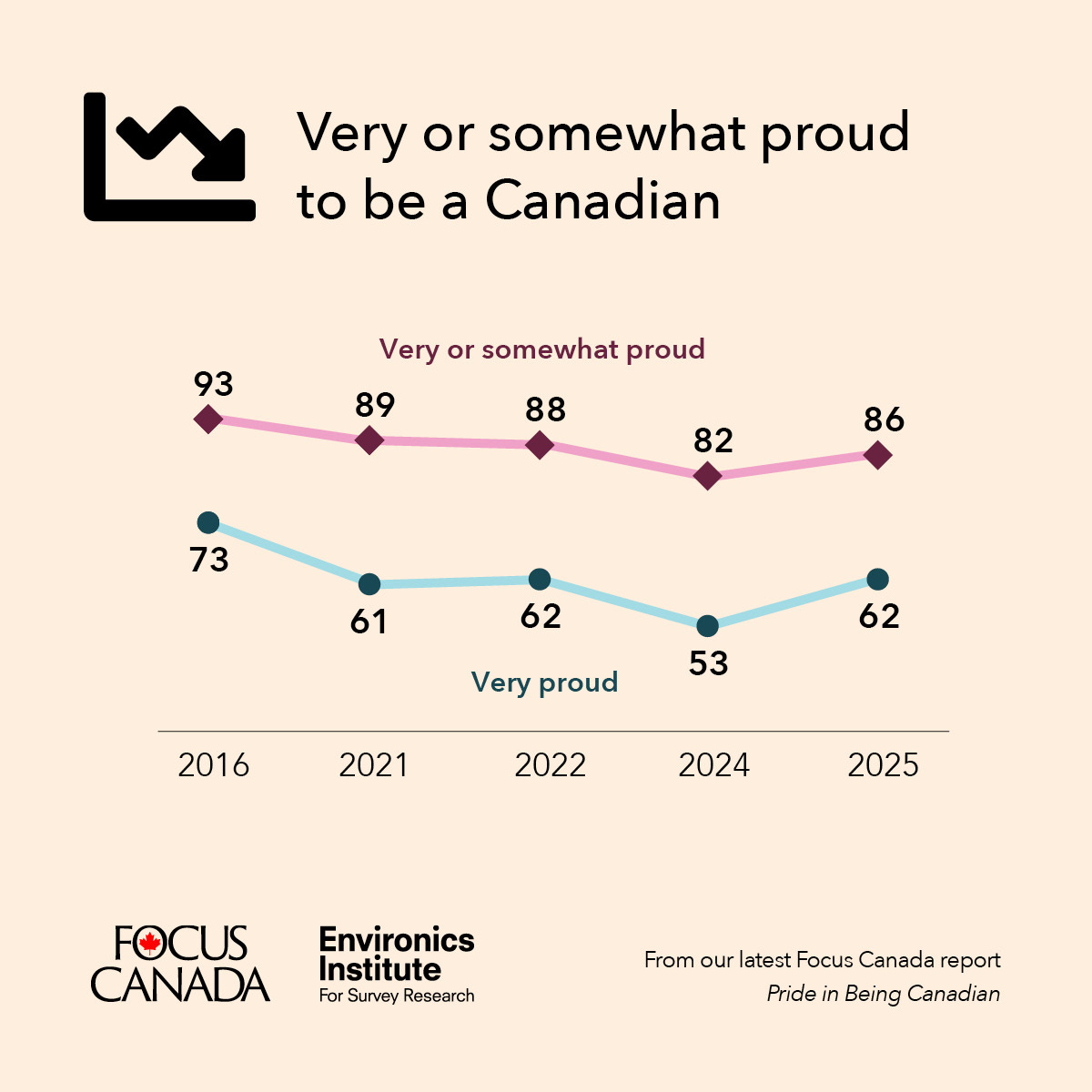What do Canadian Conservatives and U.S. Democrats have in common?
A Canada Day / Fourth of July special edition
I wasn’t planning to write about “pride in being a Canadian” again so soon in this newsletter, since there’s a new report on the topic posted on the Environics Institute website. But then Gallup published a new report on national pride in the United States, and the chance to do a quick comparison is just too good to pass up. (Thanks to my colleague
for bringing the Gallup report to my attention.)And so, to mark Canada Day 2025 — and, in the interest of balance, the 4th of July holiday in the U.S. — here’s a quick look at the state of national pride in the two countries.
First, we have contrasting headlines. In the U.S., national pride has reached a new low (the Gallup tracking goes back to 2001). That was our headline in Canada last year; but this year, the main story is about a rebound. Strong pride in being a Canadian rose by nine percentage points between the fall of 2024 and the spring of 2025.
Here are the two trends for comparison (our longer times series, going back to 1985, is available in the report).
The comparison is an imperfect one, because the two questions use slightly different scales (we use a four-point scale, while Gallup uses a five-point one). This means we should be cautious about saying the level of national pride is higher or lower in one country compared to the other. But we can compare the trends. Both countries experienced a decline in strong feelings of national pride over the past decade, with the difference being that, most recently, the trend is continuing in the United States but reversing in Canada.
Of course, the punchline is that these recently divergent trends — the latest drop in the U.S., and the recent rebound in Canada — are both triggered by the arrival in office of the same American president.
The most interesting part, however, comes when we compare levels of strong national pride among supporters of the main political parties in each country. As Gallup explains, “Democrats are mostly responsible for the drop in U.S. pride this year.” In 2001, there was a three-point gap in the levels of strong national pride expressed by Republicans and Democrats; this year the gap has widened to an astonishing 56 points.
But guess where else the gap between party supporters has widened? When our tracking started in 1985, there was a two-point gap in the levels of strong national pride expressed by Liberal and (Progressive) Conservative party supporters; this year the gap between Liberals and Conservatives has widened to 34 points.
Supporters of the U.S. Democrats on the one hand, and of the Canadian Conservatives on the other, have both dropped far away from the level of national pride expressed by supporters of the governing party in their respective countries, although the motivations for this change are no doubt very different in each case. The fact that, in their answers to this question, Canadian Conservatives look much more like U.S. Democrats than Republicans should be enough to dispel the idea that “national pride” is the purview of the political right.
Finally, it’s worth noting that the two surveys report the same trends across age groups. Gallup finds that younger generations are less likely than older ones to express strong national pride, but the decline has occurred across all age groups. The longer-term pattern is the same in Canada (but with a recent rebound for all age groups in 2025).
And with that, I wish you all a Happy Canada Day!
The Canadian data in this post are from the Environics Institute’s Focus Canada surveys. The Spring 2025 survey is based on telephone interviews conducted (via landline and cellphones) with 2,000 Canadians between May 5 and 18, 2025. A sample of this size drawn from the population produces results accurate to within plus or minus 2.2 percentage points in 19 out of 20 samples.
Thanks again to Gallup for publishing their U.S. data.
What is the Environics Institute for Survey Research? Find out by clicking here.
Follow us on other platforms:
Bluesky: @parkinac.bsky.social
Twitter: @Environics_Inst or @parkinac
Instagram and Threads: environics.institute









Bring back dominion day
Glad you wrote this timely piece and the interesting contrast, particularly on political leaning/affiliation and related polarization. In an ideal world, political leaders would be mindful of the impact of their rhetoric and the risks of excesses and consequent impact on national pride and unity.